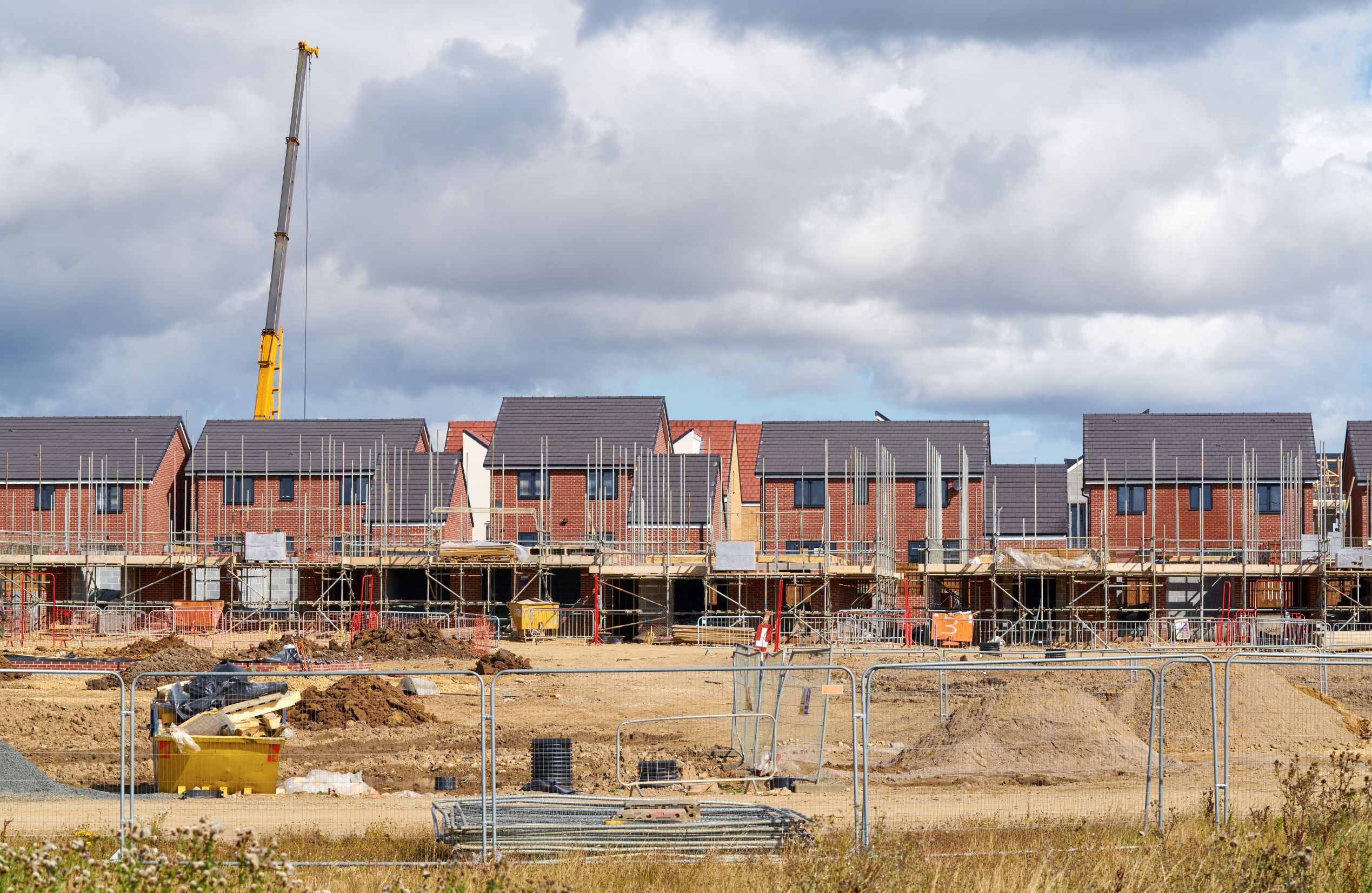2023 property outlook: Long-term structural drivers remain in place


What a difference a year makes. On the eve of 2022, the Bank of England’s official base rate sat at 0.25%. Many economists predicted a 'lower-for-longer' scenario where rates would hover close to record lows.
But 2022 had different ideas: the impact of the war in Ukraine and a pandemic-induced supply squeeze triggered global central bank action. The BoE increased the base rate on eight successive occasions from December 2021, as food and energy prices skyrocketed.
The turbulent economic waters now look set to roil property markets in 2023, in the UK and across developed markets. According to Credit Suisse, the rising cost of mortgages will squeeze households during the year, as mortgage payments rise to their highest level since 2009. All of this will have an impact on house prices. We are already seeing signs of a cooling, but the severity of any correction remains uncertain.
Prices cool-off
British banks and building societies estimate that they will lend 23% less to home buyers in 2023, taking mortgage volumes back to pre-pandemic levels. Trade institution UK Finance has forecasted that gross mortgage lending for house purchases would slide to £131bn ($16bn) in 2023, from £171bn in 2022.
And while official numbers show prices remained in a tight range between August and September, the latest reports from Rightmove reveal month-on-month falls in house prices. However, it is important to note that last year was a game of two halves – according to government figures, UK house prices increased by 7.8% in the year to June 2022.
Given the gloomy picture, what can investors in residential development expect in the year ahead?
First, we will see the impact of rate tightening and the cost-of-living squeeze. There is a global economic consensus that property prices will fall due to the shift in monetary regime – and the UK is not immune.
We are already seeing the impact on the property development landscape. British Land recently reported a loss as property valuations slide amid growing economic turbulence. The FTSE 100 company cited soaring inflation driving rising property yields and depressed values across the firm's portfolio.
Deteriorating consumer incomes will hit business investment plans and demand to lease offices – and ultimately this will impact residential demand.
We can expect a correction, but this is not a 2008-style scenario – both banks and non-bank lenders are in a far more robust situation this time around. They are far better capitalised and sources of funding in this market are less concentrated than previously. There also remains a long-term supply/demand mismatch, which should support a softer landing in the event of a slowdown. I believe a fall may, in hindsight, even be viewed as a healthy pullback – particularly with the problems around affordability for younger people.
Taxing issues ahead
One potential hurdle is around the combined effect of increased taxes and political uncertainty. Berkeley and other developers are reported to be already assessing the impact of the increase in corporation tax of 6%, and the 4% RPDT (residential property developer tax).Housing secretary, Michael Gove, has so far taken a combative attitude towards the industry and there are gathering concerns among developers that the government is going ahead with its plans to introduce an additional Building Safety Levy with the target of raising £3bn. The fear is this could hamper fresh investment in brownfield regeneration.

Constructive outlook
Despite the headwinds, developers should adopt a long-term mindset. Looking back into history, we see that developers and lenders who continued to fund and build through a downturn typically emerge stronger – and in a position to take market share - once things get better. For investors, the same is true – a long-term time horizon in residential development lending is vital for realising strong risk-adjusted returns.
Thus, developers and investors should be viewing 2023 as a challenge but also an opportunity. Without doubt, well-capitalised quality developers are better equipped to ride out volatility and build their footprint. Despite concerns about the economy and rising inflation, there is a huge need to increase the UK’s pool of residential property – and, despite near-term stealth taxes on developers, the government remains committed to its manifesto pledge of building new homes. This means developers remain optimistic about growing their businesses.
Ultimately, slowdowns are inevitable and part of the cyclical nature of the property market – that is why it is crucial to adopt a long-term perspective.
Click here to find out more about property finance at Downing

What a difference a year makes. On the eve of 2022, the Bank of England’s official base rate sat at 0.25%. Many economists predicted a 'lower-for-longer' scenario where rates would hover close to record lows.
But 2022 had different ideas: the impact of the war in Ukraine and a pandemic-induced supply squeeze triggered global central bank action. The BoE increased the base rate on eight successive occasions from December 2021, as food and energy prices skyrocketed.
The turbulent economic waters now look set to roil property markets in 2023, in the UK and across developed markets. According to Credit Suisse, the rising cost of mortgages will squeeze households during the year, as mortgage payments rise to their highest level since 2009. All of this will have an impact on house prices. We are already seeing signs of a cooling, but the severity of any correction remains uncertain.
Prices cool-off
British banks and building societies estimate that they will lend 23% less to home buyers in 2023, taking mortgage volumes back to pre-pandemic levels. Trade institution UK Finance has forecasted that gross mortgage lending for house purchases would slide to £131bn ($16bn) in 2023, from £171bn in 2022.
And while official numbers show prices remained in a tight range between August and September, the latest reports from Rightmove reveal month-on-month falls in house prices. However, it is important to note that last year was a game of two halves – according to government figures, UK house prices increased by 7.8% in the year to June 2022.
Given the gloomy picture, what can investors in residential development expect in the year ahead?
First, we will see the impact of rate tightening and the cost-of-living squeeze. There is a global economic consensus that property prices will fall due to the shift in monetary regime – and the UK is not immune.
We are already seeing the impact on the property development landscape. British Land recently reported a loss as property valuations slide amid growing economic turbulence. The FTSE 100 company cited soaring inflation driving rising property yields and depressed values across the firm's portfolio.
Deteriorating consumer incomes will hit business investment plans and demand to lease offices – and ultimately this will impact residential demand.
We can expect a correction, but this is not a 2008-style scenario – both banks and non-bank lenders are in a far more robust situation this time around. They are far better capitalised and sources of funding in this market are less concentrated than previously. There also remains a long-term supply/demand mismatch, which should support a softer landing in the event of a slowdown. I believe a fall may, in hindsight, even be viewed as a healthy pullback – particularly with the problems around affordability for younger people.
Taxing issues ahead
One potential hurdle is around the combined effect of increased taxes and political uncertainty. Berkeley and other developers are reported to be already assessing the impact of the increase in corporation tax of 6%, and the 4% RPDT (residential property developer tax).Housing secretary, Michael Gove, has so far taken a combative attitude towards the industry and there are gathering concerns among developers that the government is going ahead with its plans to introduce an additional Building Safety Levy with the target of raising £3bn. The fear is this could hamper fresh investment in brownfield regeneration.

Constructive outlook
Despite the headwinds, developers should adopt a long-term mindset. Looking back into history, we see that developers and lenders who continued to fund and build through a downturn typically emerge stronger – and in a position to take market share - once things get better. For investors, the same is true – a long-term time horizon in residential development lending is vital for realising strong risk-adjusted returns.
Thus, developers and investors should be viewing 2023 as a challenge but also an opportunity. Without doubt, well-capitalised quality developers are better equipped to ride out volatility and build their footprint. Despite concerns about the economy and rising inflation, there is a huge need to increase the UK’s pool of residential property – and, despite near-term stealth taxes on developers, the government remains committed to its manifesto pledge of building new homes. This means developers remain optimistic about growing their businesses.
Ultimately, slowdowns are inevitable and part of the cyclical nature of the property market – that is why it is crucial to adopt a long-term perspective.
Click here to find out more about property finance at Downing

What a difference a year makes. On the eve of 2022, the Bank of England’s official base rate sat at 0.25%. Many economists predicted a 'lower-for-longer' scenario where rates would hover close to record lows.
But 2022 had different ideas: the impact of the war in Ukraine and a pandemic-induced supply squeeze triggered global central bank action. The BoE increased the base rate on eight successive occasions from December 2021, as food and energy prices skyrocketed.
The turbulent economic waters now look set to roil property markets in 2023, in the UK and across developed markets. According to Credit Suisse, the rising cost of mortgages will squeeze households during the year, as mortgage payments rise to their highest level since 2009. All of this will have an impact on house prices. We are already seeing signs of a cooling, but the severity of any correction remains uncertain.
Prices cool-off
British banks and building societies estimate that they will lend 23% less to home buyers in 2023, taking mortgage volumes back to pre-pandemic levels. Trade institution UK Finance has forecasted that gross mortgage lending for house purchases would slide to £131bn ($16bn) in 2023, from £171bn in 2022.
And while official numbers show prices remained in a tight range between August and September, the latest reports from Rightmove reveal month-on-month falls in house prices. However, it is important to note that last year was a game of two halves – according to government figures, UK house prices increased by 7.8% in the year to June 2022.
Given the gloomy picture, what can investors in residential development expect in the year ahead?
First, we will see the impact of rate tightening and the cost-of-living squeeze. There is a global economic consensus that property prices will fall due to the shift in monetary regime – and the UK is not immune.
We are already seeing the impact on the property development landscape. British Land recently reported a loss as property valuations slide amid growing economic turbulence. The FTSE 100 company cited soaring inflation driving rising property yields and depressed values across the firm's portfolio.
Deteriorating consumer incomes will hit business investment plans and demand to lease offices – and ultimately this will impact residential demand.
We can expect a correction, but this is not a 2008-style scenario – both banks and non-bank lenders are in a far more robust situation this time around. They are far better capitalised and sources of funding in this market are less concentrated than previously. There also remains a long-term supply/demand mismatch, which should support a softer landing in the event of a slowdown. I believe a fall may, in hindsight, even be viewed as a healthy pullback – particularly with the problems around affordability for younger people.
Taxing issues ahead
One potential hurdle is around the combined effect of increased taxes and political uncertainty. Berkeley and other developers are reported to be already assessing the impact of the increase in corporation tax of 6%, and the 4% RPDT (residential property developer tax).Housing secretary, Michael Gove, has so far taken a combative attitude towards the industry and there are gathering concerns among developers that the government is going ahead with its plans to introduce an additional Building Safety Levy with the target of raising £3bn. The fear is this could hamper fresh investment in brownfield regeneration.

Constructive outlook
Despite the headwinds, developers should adopt a long-term mindset. Looking back into history, we see that developers and lenders who continued to fund and build through a downturn typically emerge stronger – and in a position to take market share - once things get better. For investors, the same is true – a long-term time horizon in residential development lending is vital for realising strong risk-adjusted returns.
Thus, developers and investors should be viewing 2023 as a challenge but also an opportunity. Without doubt, well-capitalised quality developers are better equipped to ride out volatility and build their footprint. Despite concerns about the economy and rising inflation, there is a huge need to increase the UK’s pool of residential property – and, despite near-term stealth taxes on developers, the government remains committed to its manifesto pledge of building new homes. This means developers remain optimistic about growing their businesses.
Ultimately, slowdowns are inevitable and part of the cyclical nature of the property market – that is why it is crucial to adopt a long-term perspective.
Click here to find out more about property finance at Downing

What a difference a year makes. On the eve of 2022, the Bank of England’s official base rate sat at 0.25%. Many economists predicted a 'lower-for-longer' scenario where rates would hover close to record lows.
But 2022 had different ideas: the impact of the war in Ukraine and a pandemic-induced supply squeeze triggered global central bank action. The BoE increased the base rate on eight successive occasions from December 2021, as food and energy prices skyrocketed.
The turbulent economic waters now look set to roil property markets in 2023, in the UK and across developed markets. According to Credit Suisse, the rising cost of mortgages will squeeze households during the year, as mortgage payments rise to their highest level since 2009. All of this will have an impact on house prices. We are already seeing signs of a cooling, but the severity of any correction remains uncertain.
Prices cool-off
British banks and building societies estimate that they will lend 23% less to home buyers in 2023, taking mortgage volumes back to pre-pandemic levels. Trade institution UK Finance has forecasted that gross mortgage lending for house purchases would slide to £131bn ($16bn) in 2023, from £171bn in 2022.
And while official numbers show prices remained in a tight range between August and September, the latest reports from Rightmove reveal month-on-month falls in house prices. However, it is important to note that last year was a game of two halves – according to government figures, UK house prices increased by 7.8% in the year to June 2022.
Given the gloomy picture, what can investors in residential development expect in the year ahead?
First, we will see the impact of rate tightening and the cost-of-living squeeze. There is a global economic consensus that property prices will fall due to the shift in monetary regime – and the UK is not immune.
We are already seeing the impact on the property development landscape. British Land recently reported a loss as property valuations slide amid growing economic turbulence. The FTSE 100 company cited soaring inflation driving rising property yields and depressed values across the firm's portfolio.
Deteriorating consumer incomes will hit business investment plans and demand to lease offices – and ultimately this will impact residential demand.
We can expect a correction, but this is not a 2008-style scenario – both banks and non-bank lenders are in a far more robust situation this time around. They are far better capitalised and sources of funding in this market are less concentrated than previously. There also remains a long-term supply/demand mismatch, which should support a softer landing in the event of a slowdown. I believe a fall may, in hindsight, even be viewed as a healthy pullback – particularly with the problems around affordability for younger people.
Taxing issues ahead
One potential hurdle is around the combined effect of increased taxes and political uncertainty. Berkeley and other developers are reported to be already assessing the impact of the increase in corporation tax of 6%, and the 4% RPDT (residential property developer tax).Housing secretary, Michael Gove, has so far taken a combative attitude towards the industry and there are gathering concerns among developers that the government is going ahead with its plans to introduce an additional Building Safety Levy with the target of raising £3bn. The fear is this could hamper fresh investment in brownfield regeneration.

Constructive outlook
Despite the headwinds, developers should adopt a long-term mindset. Looking back into history, we see that developers and lenders who continued to fund and build through a downturn typically emerge stronger – and in a position to take market share - once things get better. For investors, the same is true – a long-term time horizon in residential development lending is vital for realising strong risk-adjusted returns.
Thus, developers and investors should be viewing 2023 as a challenge but also an opportunity. Without doubt, well-capitalised quality developers are better equipped to ride out volatility and build their footprint. Despite concerns about the economy and rising inflation, there is a huge need to increase the UK’s pool of residential property – and, despite near-term stealth taxes on developers, the government remains committed to its manifesto pledge of building new homes. This means developers remain optimistic about growing their businesses.
Ultimately, slowdowns are inevitable and part of the cyclical nature of the property market – that is why it is crucial to adopt a long-term perspective.
Click here to find out more about property finance at Downing

Please fill out the form to download the full report
Related Insights
View all2024 has laid the foundations for the UK housing market in 2025

2024 has laid the foundations for the UK housing market in 2025

Macroeconomic concerns drive institutional investors to specialist property development finance firms, Downing research shows

Macroeconomic concerns drive institutional investors to specialist property development finance firms, Downing research shows

Downing LLP does not provide advice or make personal recommendations and investors are strongly urged to seek independent advice before investing. Investments offered on this website carry a higher risk than many other types of investment and prospective investors should be aware that capital is at risk and the value of their investment may go down as well as up. Any investment should only be made on the basis of the relevant product literature and your attention is drawn to the risk, fees and taxation factors contained therein. Tax treatment depends on individual circumstances of each investor and may be subject to change in the future. Past performance is not a reliable indicator of future performance. Downing LLP is authorised and regulated by the Financial Conduct Authority (Firm Reference Number 545025). Registered in England No. OC341575. Registered Office: Downing, 10 Lower Thames Street, London, EC3R 6AF.








